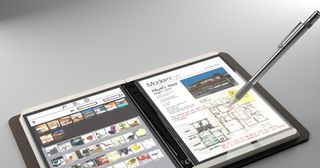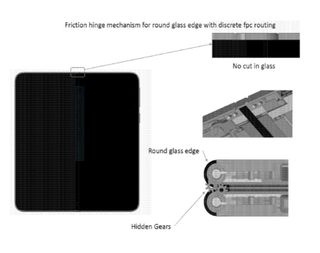Folding phones: Is this the beginning of the end of slate-shaped smartphones?
Ten years ago slate-shaped touchscreen smartphones popularized "touching one's data" and initiated a mobile computing revolution. Today, the evolving demands of mobile computing have reached the limits of that static form factor.

Smartphone innovation has plateaued but this isn't news. In 2016 I wrote about both the saturation of the smartphone market and the technological limits slate-shaped smartphones and mobile OSes impose on increasingly demanding mobile computing. Most OEMs pursue mere incremental advances in things like camera tech and screen size.
Smartphones are capable tools for emailing, word processing, media editing and much more. But as the primary and sometimes only computer users have, there's greater demand for smartphones to handle more demanding computing scenarios.
Current smartphone form factors and OSes are not optimized for these beyond-light-mobile-computing demands, however. Thus, there's a push toward more powerful mobile platforms, convergence with desktop platforms (in some cases) and exploration into shape altering hardware to provide broader desktop or tablet-like usage options.
Folding provides more options








Folding phones aren't new. Twenty years ago clamshell phones were popular and in a very rudimentary sense the design represents what's motivating companies to explore folding smartphones. Folding designs provide more device "real estate" and opportunities for practical and creative use of the multiple device configurations folding enables.
For instance, many clamshell phones had small secondary displays that showed the time, notifications and more when closed. When opened the primary display and keypad allowed primary device functionality. This is a rudimentary comparison, but the point is made.
OEMs are exploring foldable hardware because conceivably it maintains the advantages of current smartphone designs when folded, and potentially provides the tablet or mini-laptop form factor required for more demanding computing scenarios when unfolded.
Get the Windows Central Newsletter
All the latest news, reviews, and guides for Windows and Xbox diehards.
Of course, software is a critical component of this form-shifting hardware.
Microsoft's Core OS is the software side of folding hardware
Folding phones are coming...back

Microsoft, Samsung, LG, Lenovo, Apple and others have either provided prototypes, filed patents or are rumored to be on the verge of releasing foldable devices.
These companies must overcome challenges which include designing a bendable display that can endure the rigors of long-term use, ensuring the display quality we're accustomed to and producing these displays in volume at an affordable price.
Qualcomm manager of display technology Salman Saeed said, "materials science just isn't there yet to create a screen that can withstand repeated bending, but adds, "it's possible for phone companies to bring foldable phones to market".
More than a gimmick
Samsung targets young users with Galaxy S9 to weather a global market slowdown https://t.co/ouFvFJljCh #MWC18 pic.twitter.com/J1qJZj8xVsSamsung targets young users with Galaxy S9 to weather a global market slowdown https://t.co/ouFvFJljCh #MWC18 pic.twitter.com/J1qJZj8xVs— Reuters (@Reuters) February 26, 2018February 26, 2018
Folding must be more than a gimmick. If the device folds for folding's sake but doesn't offer value or usage advantages the novelty of folding will quickly wear thin, and the challenges of accommodating more demanding computing on consumer's mobile devices will remain.
This is where the combination of "folding and unfolding" hardware must take advantage of context-sensitive software. Tech companies must keep the purpose of folding devices in view (answering the demands of more desktop- or tablet-like computing) as they apply the combination of hardware and software to its development.
Companies that are hyper-focused on annual incremental changes to slate-style phones may be more susceptible to introducing a folding phone for the sake of differentiation rather than purposeful function.
Microsoft's Andromeda may check the right boxes





Microsoft's rumored Windows Core OS-based Project Andromeda addresses the hardware and software aspects related to a folding device in a way competitors may not. Windows Core OS, based on OneCore, provides a single OS across device types and device configurations. Folded as a handheld, unfolded as a tablet or docked as a desktop PC, the OS and accompanying UWP apps on an Andromeda device would conform accordingly to the context.
Of course, Microsoft is plagued with poor developer support, a history of failure in the mobile space, and the challenge of communicating the position of this telephony-enabled, pen-focused PC to a smartphone-centric market that is cold to Microsoft's mobile efforts. Still, this new device category which Microsoft hopes OEMs will embrace seems to check all the boxes for which folding devices are being pursued.
As a full telephony-enabled PC on the cellular roadmap, with an OS that will presumably accommodate mobile and desktop scenarios it may provide users with the configuration options for more demanding mobile computing beyond smartphones' capabilities.
How Qualcomm and Microsoft are making PCs post-smartphone devices
Bringing other factors into the fold

Potential iOS or Android-based folding devices would have an advantage over Microsoft's option when used as smartphones due to strong mobile ecosystems. Microsoft's Andromeda device category would presumably be stronger in desktop-like computing scenarios. But both would be on the mobile cellular roadmap which provides opportunities for Microsoft.
Microsoft's and Qualcomm's bringing Windows PCs to the cellular roadmap is critical to its Andromeda device category which like Always Connected PCs, is also a cellular PC. Always connected PCs will introduce users to eSIM, buying data from the Windows Store and changing carriers as they please.
This consumer-compelled demand may provoke carriers to offer more competitive data packages and to stock Always Connected PCs to better position their data (potentially voice in future) packages to consumers. Providing data through the Store is, therefore, more about Microsoft strategically gaining leverage with carriers than anything else. This is important to its folding device strategy.
Potential OEM partner devices patterned after Microsoft's Andromeda PC would strategically benefit from the consumer-data-purchasing model, and carrier relationships Always Connected PCs introduce.
Finally, Microsoft's embrace of Progressive Web Apps is in part Microsoft's attempt to compensate for the devices weakness when in "mobile-mode".
PWAs may be the great equalizer for Microsoft, Google and Apple
Watching it all unfold…
Motorola RAZR V4 folding phone concept.
Many companies are exploring folding devices. But do the hardware and software approaches answer the need for which they are being pursued. Microsoft's one OS platform and context conforming Surface hardware suggest it could succeed. Will the challenges facing the company cause it to fold its hand as it did with smartphones, or will it play the hand its dealt? Time will tell.
Related reading:
Even if Windows 10 Mobile succeeded, Microsoft would still be pursuing a post-smartphone strategy
Jason L Ward is a columnist at Windows Central. He provides unique big picture analysis of the complex world of Microsoft. Jason takes the small clues and gives you an insightful big picture perspective through storytelling that you won't find *anywhere* else. Seriously, this dude thinks outside the box. Follow him on Twitter at @JLTechWord. He's doing the "write" thing!
